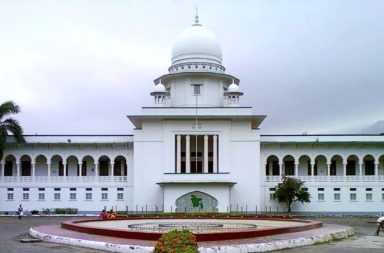By G M Shuvo
The industry of digital and digitally distributable contents (popularly known as creative industry) pertains the combination of music, movie, book, art, software etc. to entertain the consumers. Molded by people with immense creativity and passion to bring out a product, this creative industry holds a significant importance in the overall socioeconomic development of a country. For instance, the USA braces 11% GDP from creative industry every year. However, the revenue retained from creative industry can spike up to 30% of the total revenue.
The creative industry of Bangladesh, however, is contributing far less and deficient in percentage comparing to the other South Asian Countries. Music, movie, Art and Book industries and software industries of Bangladesh are striving hard to preserve its existence particularly in domestic market, almost like surviving in a dead man’s chest. One of the major reasons of this tormenting situation is piracy, which plays a vital role in back-leashing the billion-dollar industry. Owing to the rapid extension of technology and internet, piracy (to be very specific, digital piracy) got its breadth dimension.
It is often told that piracy is deadlier than nuclear weapons in terms of destroying creative industry. Content owners who represent creative industry are entangled in a crisis which resulted into the collapse of releasing music albums, movies, software etc., which gradually demotivates the artists and content creators. What is more worse that this open practice of piracy has penetrated into the psyche of the consumers of the country, which creates a pool of of freeloaders who don’t like to pay for creative contents.
Protection of copyright in Bangladesh
For the prevention of piracy in Bangladesh, an anti-piracy legislation called The Copyright Act, 2000 (amended in 2005) was implemented by the Govt. Section 14 of the Act defines copyright as the limitation of reproducing the work, issuing copies of the work to the public, performing or broadcasting the work, making any translation or adaption of the work and such other related issues which can solely be exercised by the copyright holder. According to the section 15 of The Copyright Act, creative contents including literary works, dramatic works, musical works, artistic works, cinematographic films, sound recordings and computer programs are eligible for copyright protection.
Both civil and criminal remedies are available in case of copyright infringement. Civil remedy described under section 76 of the Act includes compensation, prohibitory order, acquisition of copies etc. Violation of copyright leads to a criminal charge of minimum six months of imprisonment and a fine of minimum 50,000 tk and maximum 2,00,000 tk.
However, scrutinizing the application of this Act reveals that, this is one of the least practically applied acts of Bangladesh. No notable application of this act has been observed in the recent years, except the “Aynabaji” case; in which a man was arrested for executing piracy of this film. This horrible rate of application is sufficient to determine how this Act is implemented. No website has been clogged off for distributing movies, songs, eBooks and software illegally.
On the contrary, countries like USA, UK and India have shown tremendous progress on applying their Anti-piracy and copyright related laws. Recently a Ph.D. student was convicted and punished with 6,50,000 dollars for illegally downloading 30 songs, 22,500 dollars for each song in USA. Thousands of websites are also being snipped in USA. UK has also adopted legal measures against piracy according to their laws and also monitoring peer to peer file sharing. Indian anti-piracy authority has blocked hundreds of websites and arrested many in order to protect their creative industry from piracy.
Limitations of the Copyright Act
The Copyright Act of Bangladesh has failed to reach the expected benchmark due to numerous reasons.
Mostafa Jabbar, a copyright activist of Bangladesh termed this act as an “archaic, outdated and good for nothing”. After examining the act deeply, the cavity can be skinned out. The British first enacted it in 1914 and in 1962, the act was readopted by Pakistan with slight medications. And finally in 2000, Bangladesh inherited the Act through further modifications. A close observation will portray that, this act is inefficient enough to cope with the frequently changing internet-based techno-world.
Furthermore, this Act did not directly prohibit the personal use of illegally obtained contents. According to the section 82 of this Act, if the defendant can prove that he didn’t distribute pirated copies for commercial purpose, he will be awarded a smaller sentence, which certainly would inspire piracy implicitly. Another loop hole of this Act is, there is no direct guideline for monitoring and controlling website based piracy. Bangladeshi citizens are habituated with not paying for music, film, eBook, software and other digital contents. Almost 100% of our population is directly or indirectly involved with piracy, and it’s really tough to make us pay for something that has been free for years. Though we have struggling middle class families and a huge number of people under the poverty line, but recently there is tremendous rise in our economy which is visible in the money spent on restaurants, sports events and social-cultural occasions like New Year’s Eve. Yet, we tend to pay nothing for creative contents. Rather, the general tendency is to opt for pirated websites or other methods to get the creative contents at free of cost, demeaning the creation of the content owner. Ultimately, a bad culture is slowly rising up that that not paying for digital goods is not a crime at all.
Incognizance of the content creator is one of the most important factors behind the failure of Copyright Act in Bangladesh. From 1962 to 2017, only forty films have been registered for copyright. According to the section 41 of The Copyright Act, 2000, a mechanism called “Collective Management Organizations” (CMO) is prescribed. But the content owners have failed to constitute CMO till now.
Another vital factor is, indifference of the law enforcing agencies. While UK has its own intellectual property ministry to regulate creative industry rights, we don’t even have an active office to regulate creative industry rights. The copyright office has done nothing except registering copyrights of few products. Lack of knowledge among the police officers regarding digital piracy and copyright is also a key issue. According to the section 93 of Copyright Act 2000, a police officer at least having the designation of Sub-Inspector can seize pirated copies of a content without any prior notice. But police officers hardly exercise this rule and most of them don’t even know there exists a direction regarding back-logging piracy.
Recommendations
Good governance is required in every industry to accelerate the growth of that industry, and good governance requires three steps which are (1) making Laws, (2) Institutional infrastructure and (3) Enforcement. Our legislatures have made the copyright act, which must be well-backed by remaining two factors mentioned above to be a fruitful and efficient Act alongside the required amendments. The Govt. may also consider establishing an anti-piracy board which shall have the required expertise to tackle online and tech-based piracy. A special wing of Human Resource Management and Development can be designated under the Ministry of Public Administration to preserve the intellectual property of our country. Most importantly, institutionalized vocational training should be provided to the law enforcing agencies regarding digital crimes, i:e: piracy, hacking etc. and the framework of copyright laws.
Furthermore, to make the content owners aware about their right awarded by this act and encourage them to abide by those legal resolutions is a massive challenge which is equally important as implementing the law itself.
Addressing piracy in Bangladesh is a huge challenge, a long uphill trek through an arduous mountain. A coordinated effort from the Govt. and all stakeholders are required to improve and implement the law for nurturing and thriving of the creative industry in Bangladesh.




